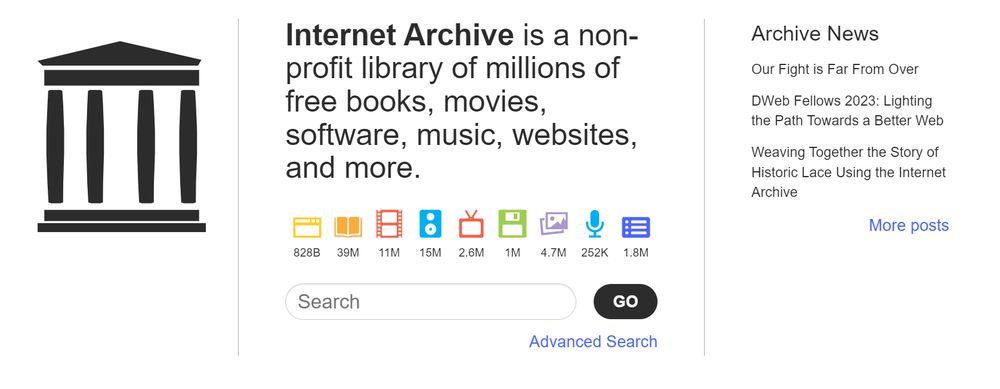Organizations, producers, record companies and publishers are increasingly trying to limit free access to their content. Now the shadow hangs over a service that has offered thousands of free movies, songs and books for years. Some say that its end could be near.
In the last few days, all the torpedoes of the corporate artillery have been aimed at the same target: the Internet Archive. This massive website that has accumulated content for more than 25 years is in the spotlight. Big companies don’t like to share their products for free with users.
Everyone Against the Internet Archive
That there is something that is offered for free does not like any large corporation. Music companies, publishers and film production companies are up in arms against the Internet Archive because they want it to fall. The web hides behind the fact that it does the same service as a traditional library, sharing the products available for the benefit of users, always without profit. And they play it safe by sharing old, retro products whose licenses might have expired, or other similar posts.

However, it is not enough. In the last few hours Internet Archive has had to legally defend itself against both a group of publishers from the world of books and music record companies. They all want the same thing: that the web pays. But considering their non-profit profile, it’s hard to imagine that they could face the huge lawsuits that could be imposed on them in court.
fighting for democracy
As much as the Internet Archive is a non-profit organization, it doesn’t mean that they don’t have a good team of lawyers who are fighting their best in court. In 2020, a group of some of the most important publishers took them to court and, recently, it has been confirmed that the judge agreed with them. But from the Internet Archive they looked for a second chance. They have spoken with Penguin Random House, John Wiley & Sons, HarperCollins and Hachette and have reached an agreement.
The amount is unknown, but the Internet Archive has promised to pay them specific money if they are given the opportunity to appeal the judge’s decision and end up losing. Publisher representatives are pleased with the offer, so it may not be a small number. The question is to know what will happen if in the end they lose and have to pay. Will they be able to do it? They say, however, that they are convinced that they will be able to successfully appeal the judge’s decision. The reason for this is that they say they have evidence that would confirm that the judge made some mistakes. At the same time, they appeal to democracy and the rights that citizens have to be able to access content freely and, in this case, digitally.

This is going to be a pivotal moment for the Internet Archive, as they may be convinced that a victory against publishers could also guarantee the same kind of victory against companies in other industries. Not surprisingly, in recent days they have received a complaint from record companies, including Sony and Universal, who say that the shared music files from their catalogs would have caused losses of more than 400 million dollars.
Music producers argue that their discographies are not at risk of disappearing and that they are readily available on different streaming services such as Spotify. But the Internet Archive, which has a project whereby it receives recordings in all kinds of formats and digitizes them for sharing, says they have the right to protect culture and share it with everyone who wants to access it. This latest complaint from the world of music has not come at a good time in view of the situation they are going through, and it could get even more complicated if film production companies also jump into battle.

The Internet Archive has thousands and thousands of movies, songs, books, video games, web pages, and any other content you can imagine. Everything is stored and shared. In parallel, the organization, which was founded by Brewster Kahle, carries out other archiving and administration work for entities that require it. That is what has led them to have a constant income year after year and to be able to maintain a staff of more than 150 workers. But their profits, amounting to about $30 million a year, would possibly be nothing if the full weight of justice fell on them. That is why it is feared that, although they fight tooth and nail, the Internet Archive will end up disappearing one day. It would undoubtedly be a great loss for users.













